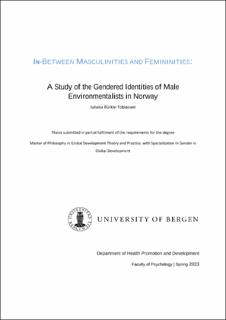| dc.description.abstract | Background. Research on the relationship between gender and environmentalism is increasingly prevalent. Studies on men and masculinities tend to focus on the negative impact of traditional constructions of masculinities on the environment. On the other hand, little research examines the gendered identities of male environmentalists. Moreover, in countries like Norway, where egalitarian values are emphasised, the gendered identities of male environmentalists are currently under-researched. Research objectives. The objective of this study is to examine the gendered identities of male environmentalists in Norway, particularly their conceptualisations of masculinities and femininities. Additionally, this study aims to explore the connection between the gendered identities of male environmentalists and their environmental engagement. Data Material and Methods. The data of the study consists of interviews with six male environmentalists in Norway with an organisational, institutional, or political background in environmental engagement. The in-depth interviews were semi-structured. Additionally, autobiographical inquiries were partly used. The data were coded and analysed using thematic network analysis by Attride-Stirling (2001). Findings. The findings identify two main themes. First, the male environmentalists present various approaches to gendered identities. They construct masculinities through bodies, power relations, emotions, and in relation to femininities. Their constructions of masculinities are situational and contextual and are changing from resistance to engaging with hegemonic masculinities. Most of the men engaged with subordinated masculinities at a young age and developed coping strategies for their subordinated situation. Such coping strategies were to differentiate themselves from hegemonic masculinities and inhabit feminised spheres. However, they engage with hegemonic masculinities at various moments in their life. Second, the study finds a relatively close alignment between environmental engagement and feminist and queer subcultures. This alignment influences the gendered identities of some of the men. These connections lead them to engage with different forms of masculinities in relation to ecological issues. The masculinities they refer to are ecological masculinities and ecomodern masculinities. Conclusions. The findings of this study suggest that the male environmentalists’ gendered identities are multiple and portray ambivalence as their constructions change from resistance to engagement with hegemonic masculinities. In their engagement with hegemonic masculinities, they depict ambiguity in their egalitarian attitudes. Moreover, the findings suggest that the integration of feminist discourses and queer subcultures in environmental discourses influences the gendered identities of some male environmentalists. The alignment particularly shapes their values on domination over nature and feminist issues, resulting in exhibiting values that refer to ecological masculinities. Further, this integration of subculture in environmentalist spheres may exclude other people that don’t identify such spheres and discourses. Further research should investigate the conditions of emerging ecological masculinities and examine the effects of the alignment of feminism and environmental engagement on various gendered identities in more detail. Keywords: hegemonic masculinities, alternative masculinities, ecological masculinities, environmentalism, ecofeminism, Norway | |
